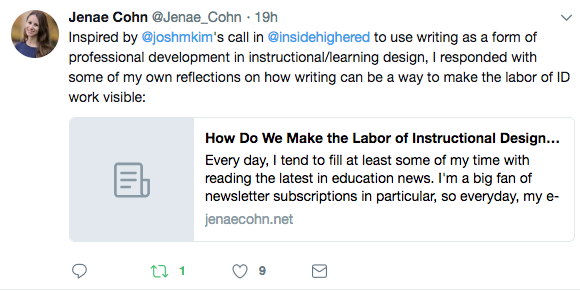You have /5 articles left.
Sign up for a free account or log in.
Last week I met Dr. Jenae Cohn. Actually, I did not meet Jenae in person. I met her by seeing her blog post How Do We Make the Labor of Instructional Design Visible? Write About It.
The way I came across this post was a tweet.

I’ve been critical of Twitter. I think that we underestimate the opportunity costs in time and energy in reading and writing for Twitter. Yet, I found Jenae on Twitter.
I’d say the key to Twitter is moderation. Tweet less. Read sparingly. Don’t let the Twitter tail wag your communications dog. But Twitter is good for connecting.
Before I saw Jenae’s tweet, I had not read her blog.
You should go read her blog. Jenae is an Academic Technology Specialist in the Program in Writing & Rhetoric at Stanford University. She earned her PhD in 2016 in English with an Emphasis in Writing, Rhetoric, and Composition Studies at the University of California, Davis.
She writes beautifully.
There is a new generation of academics like Dr. Cohn that are remaking higher education. They are advancing student learning in roles that did not exist just a few years ago. The old binary of faculty / not-faculty is breaking down.
Academic technology specialists, instructional designers, librarians, faculty developers, and other learning professionals work directly on student learning - and closely with teaching faculty - but are too often not considered as co-equal educators.
Dr. Cohn writes about this challenge of status, legitimacy, and place for non-faculty educators:
"I would like to think that perhaps a call for non-tenured (or non-tenure-track) teaching and learning professionals to write is a way to inscribe power in our positions. Working in higher education as a non-faculty member has reminded me just how hierarchical the university system. I have felt, on many occasions, resentful of the felt sense that my perspective has not seemed to matter much institutionally or that my suggestions may not be considered on equal footing with faculty, in spite of the fact that I interface with students regularly and do the direct work that impacts student experiences in our classrooms.”
The structures that support academia have not kept up with the emerging importance of non-faculty educators. Our language is running behind the reality. Professional associations have not evolved or adapted quickly enough to accommodate the growing community of non-faculty academics working as learning professionals.
The old ideas of staff and faculty divide still persist in thousands of ways, both big and small. Career paths, professional recognition, and protections of academic freedom must still be negotiated on a case-by-case and individual basis. We are all making this up as we go along.
I’m very happy to meet Dr. Jenae Cohn. To find her blog. To read her writing.
How we connect with other emerging academics such as Dr. Cohn is an important question. I hope that it is through their writing. Your writing. Twitter may be a good place to connect, but I don’t think that it is a great place to nurture ideas. The complexity and nuance of Dr. Cohn’s writing is a good example to us all.
What other emergent academics do you suggest that we read?
Who are the non-faculty learning professionals that you follow?
What professional organizations, groups, or individual champions are fighting for status and autonomy and career paths for alt-acs?
How do you make your learning work visible?








